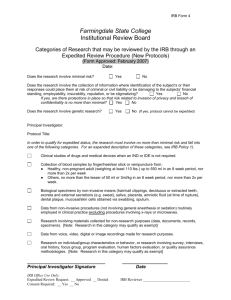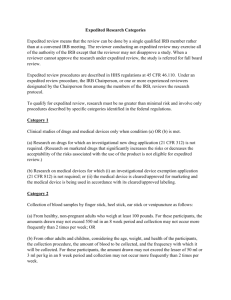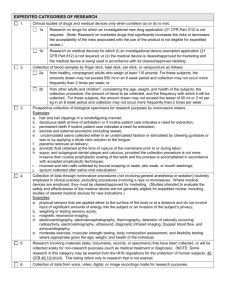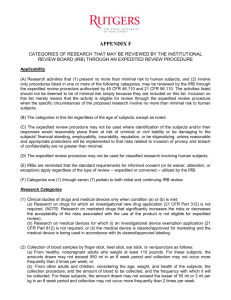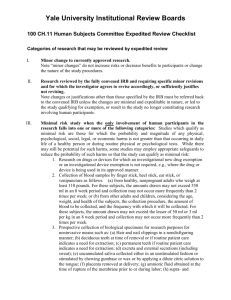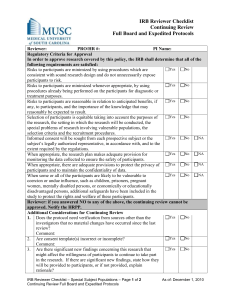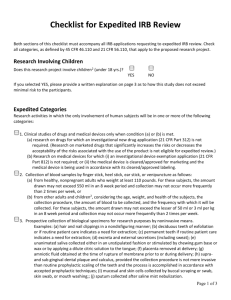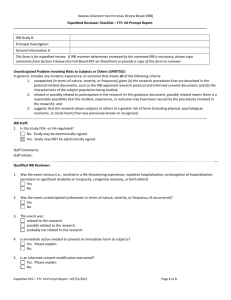Policy - Boston University
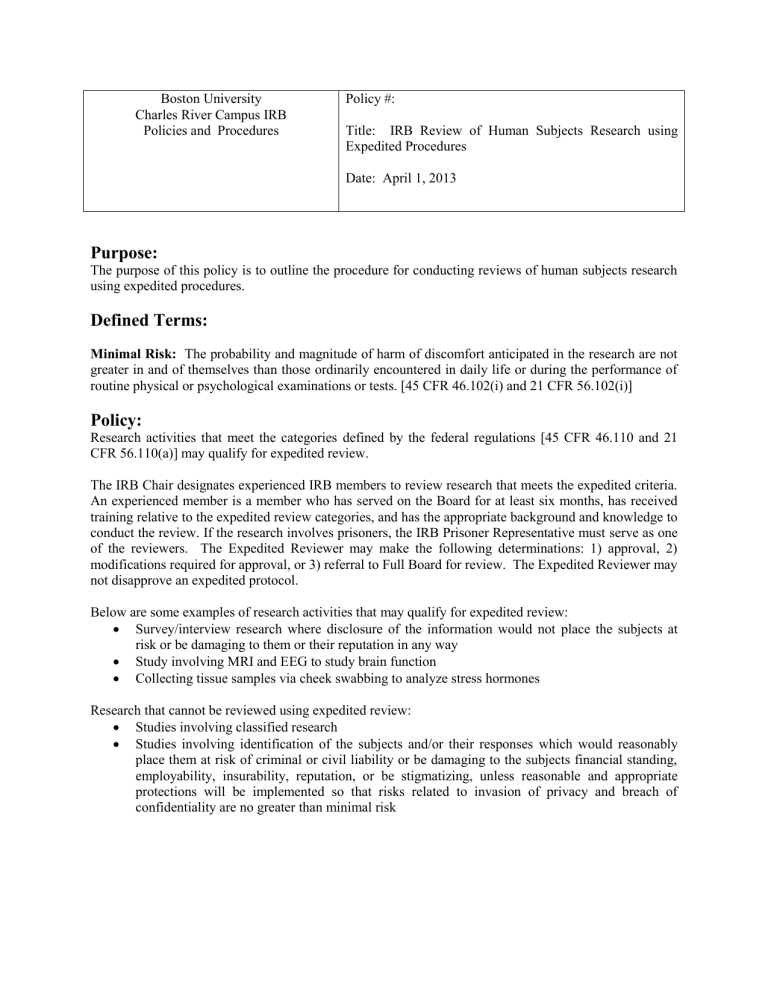
Boston University
Charles River Campus IRB
Policies and Procedures
Policy #:
Title: IRB Review of Human Subjects Research using
Expedited Procedures
Date: April 1, 2013
Purpose:
The purpose of this policy is to outline the procedure for conducting reviews of human subjects research using expedited procedures.
Defined Terms:
Minimal Risk: The probability and magnitude of harm of discomfort anticipated in the research are not greater in and of themselves than those ordinarily encountered in daily life or during the performance of routine physical or psychological examinations or tests. [45 CFR 46.102(i) and 21 CFR 56.102(i)]
Policy:
Research activities that meet the categories defined by the federal regulations [45 CFR 46.110 and 21
CFR 56.110(a)] may qualify for expedited review.
The IRB Chair designates experienced IRB members to review research that meets the expedited criteria.
An experienced member is a member who has served on the Board for at least six months, has received training relative to the expedited review categories, and has the appropriate background and knowledge to conduct the review. If the research involves prisoners, the IRB Prisoner Representative must serve as one of the reviewers. The Expedited Reviewer may make the following determinations: 1) approval, 2) modifications required for approval, or 3) referral to Full Board for review. The Expedited Reviewer may not disapprove an expedited protocol.
Below are some examples of research activities that may qualify for expedited review:
Survey/interview research where disclosure of the information would not place the subjects at risk or be damaging to them or their reputation in any way
Study involving MRI and EEG to study brain function
Collecting tissue samples via cheek swabbing to analyze stress hormones
Research that cannot be reviewed using expedited review:
Studies involving classified research
Studies involving identification of the subjects and/or their responses which would reasonably place them at risk of criminal or civil liability or be damaging to the subjects financial standing, employability, insurability, reputation, or be stigmatizing, unless reasonable and appropriate protections will be implemented so that risks related to invasion of privacy and breach of confidentiality are no greater than minimal risk
Procedures:
The activities listed in the categories below should not be considered to be of minimal risk simply because they are included on this list. Inclusion in this list only means that the activity is eligible for review through the expedited review procedures when the research involves no more than minimal risk to human subjects.
Investigators are reminded that the standard requirements for informed consent and additional safeguards and protections for vulnerable populations still apply.
Research activities may be exempt if they are determined to not be greater than minimal risk AND they fall into one of the expedited categories listed below:
1.
Clinical studies of drugs and medical devices only when condition (a) or (b) is met. a.
Research on drugs for which an investigational new drug application (21 CFR Part 312) is not required. (Note: Research on marketed drugs that significantly increases the risks or decreases the acceptability of the risks associated with the use of the product is not eligible for expedited review.) b.
Research on medical devices for which (i) an investigational device exemption application (21 CFR Part 812) is not required; or (ii) the medical device is cleared/approved for marketing and the medical device is being used in accordance with its cleared/approved labeling.
2.
Collection of blood samples by finger stick, heel stick, ear stick, or venipuncture as follows: a.
From healthy, nonpregnant adults who weigh at least 110 pounds. For these subjects, the amounts drawn may not exceed 550 ml in an 8 week period and collection may not occur more frequently than 2 times per week; or b.
From other adults and children, considering the age, weight, and health of the subjects, the collection procedure, the amount of blood to be collected, and the frequency with which it will be collected. For these subjects, the amount drawn may not exceed the lesser of 50 ml or 3 ml per kg in an 8 week period and collection may not occur more frequently than 2 times per week.
3.
Prospective collection of biological specimens for research purposes by noninvasive means.
Examples:
1.
Hair and nail clippings in a nondisfiguring manner
2.
Deciduous teeth at time of exfoliation or if routine patient care indicates a need for extraction
3.
Permanent teeth if routine patient care indicates a need for extraction;
4.
Excreta and external secretions (including sweat)
5.
Uncannulated saliva collected either in an unstimulated fashion or stimulated by chewing gumbase or wax or by applying a dilute citric solution to the tongue
6.
Placenta removed at delivery
7.
Amniotic fluid obtained at the time of rupture of the membrane prior to or during labor
8.
Supra- and subgingival dental plaque and calculus, provided the collection procedure is not more invasive than routine prophylactic scaling of the teeth and the process is accomplished in accordance with accepted prophylactic techniques
9.
Mucosal and skin cells collected by buccal scraping or swab, skin swab, or mouth washings
10.
Sputum collected after saline mist nebulization
4.
Collection of data through noninvasive procedures (not involving general anesthesia or sedation) routinely employed in clinical practice, excluding procedures involving x-rays or microwaves.
Where medical devices are employed, they must be cleared/approved for marketing. (Studies intended to evaluate the safety and effectiveness of the medical device are not generally eligible for expedited review, including studies of cleared medical devices for new indications.)
Examples:
1.
Physical sensors that are applied either to the surface of the body or at a distance and do not involve input of significant amounts of energy into the subject or an invasion of the subject’s privacy
2.
Weighing or testing sensory acuity
3.
Magnetic resonance imaging
4.
Electrocardiography, electroencephalography, thermography, detection of naturally occurring radioactivity, electroretinography, ultrasound, diagnostic infrared imaging, doppler blood flow, and echocardiography
5.
Moderate exercise, muscular strength testing, body composition assessment, and flexibility testing where appropriate given the age, weight, and health of the individual
5.
Research involving materials (data, documents, records, or specimens) that have been collected, or will be collected solely for nonresearch purposes (such as medical treatment or diagnosis)
6.
Collection of data from voice, video, digital, or image recordings made for research purposes.
7.
Research on individual or group characteristics or behavior (including, but not limited to, research on perception, cognition, motivation, identity, language, communication, cultural beliefs or practices, and social behavior) or research employing survey, interview, oral history, focus group, program evaluation, human factors evaluation, or quality assurance methodologies.
8.
Continuing review of research previously approved by the convened IRB as follows: a.
Where (i) the research is permanently closed to the enrollment of new subjects; (ii) all subjects have completed all research-related interventions; and (iii) the research remains active only for long-term follow-up of subjects; or b.
Where no subjects have been enrolled and no additional risks have been identified; or c.
Where the remaining research activities are limited to data analysis.
9.
Continuing review of research, not conducted under an investigational new drug application or investigational device exemption where categories two (2) through eight (8) do not apply but the
IRB has determined and documented at a convened meeting that the research involves no greater than minimal risk and no additional risks have been identified.
REVIEW PROCESS
Submission of Expedited Application
1.
If the Principal Investigator (PI) believes that a study meets the criteria for expedited review, the PI must complete the Expedited/Full Board Application.
2.
The PI submits the Expedited/Full Board Application and all applicable documents to the
CRC IRB for review including:
Consent/information sheet
Recruitment materials
Questionnaires, surveys, etc.
Grant Application
Expedited Review Process
1.
The Expedited/Full Board Application is received by the IRB Coordinator. The Application is assigned a study number and is entered into the IRB tracking system.
2.
The IRB Coordinator assigns the Application to the appropriate IRB member for review.
3.
The IRB member (Reviewer) will review the Application to determine if the study falls into one of the expedited categories as defined in 45 CFR 46.110 and 21 CFR 56.110(a). In addition, the reviewer will determine that the study meets the regulatory criteria for approval including: a.
Risks to subjects are minimized: (i) By using procedures which are consistent with sound research design and which do not unnecessarily expose subjects to risk, and
(ii) whenever appropriate, by using procedures already being performed on the subjects for diagnostic or treatment purposes. b.
Risks to subjects are reasonable in relation to anticipated benefits, if any, to subjects, and the importance of the knowledge that may reasonably be expected to result. In evaluating risks and benefits, the Reviewer will consider only those risks and benefits that may result from the research (as distinguished from risks and benefits of therapies subjects would receive even if not participating in the research). c.
Selection of subjects is equitable. In making this assessment, the Reviewer will take into account the purposes of the research and the setting in which the research will be conducted. d.
Informed consent will be sought from each prospective subject or the subject's legally authorized representative e.
Informed consent will be appropriately documented f.
When appropriate, the research plan makes adequate provision for monitoring the data collected to ensure the safety of subjects. g.
When appropriate, there are adequate provisions to protect the privacy of subjects and to maintain the confidentiality of data. h.
When some or all of the subjects are likely to be vulnerable to coercion or undue influence, such as children, prisoners, pregnant women, mentally disabled persons, or economically or educationally disadvantaged persons, additional safeguards have been included in the study to protect the rights and welfare of these subjects.
4.
If the Reviewer requires additional information or modifications, the Reviewer will contact the PI via e-mail. The Reviewer will review the PI’s response upon receipt. If the PI does not respond within 60 days, the study will be closed out.
Title
5.
If the Reviewer determines that the revisions are inappropriate or insufficient, the Reviewer may request that the PI make further revisions. This review and revision process will continue until the research is either approved or disapproved as exempt.
6.
If the Reviewer determines that the study requires review by an IRB member with specific scientific expertise, that member will be asked to serve as a Secondary Reviewer.
7.
Once the Reviewer determines that the study qualifies for approval, a letter will be sent to the
PI notifying him/her of the approval. The letter will include the specific category of expedited review.
8.
The approval date of the study will be the date that the Reviewer determines that all modifications have been addressed and completed.
9.
If the Reviewer determines that the study does not qualify for review by expedited procedures, the study will be referred for full board review as applicable.
10.
If the PI has concerns about the IRB’s decision or recommendations, the PI may address his/her concerns to the IRB in writing. This request should include a justification for changing the IRB’s decision. The PI should send this request to the IRB Chair/Vice-Chair and IRB Director.
11.
Studies that are approved using the expedited review process will be listed and included in the agenda packet for the next scheduled Full Board meeting.
Author
Effective Date
Last Review/Update Date
Revision #
Approved
IRB Review of Human Subjects Research using Expedited
Procedures
Cynthia Monahan
April 23, 2013
Cynthia Monahan, IRB Director
Ara Tahmassian, PhD, Associate Vice President-Research
Compliance
